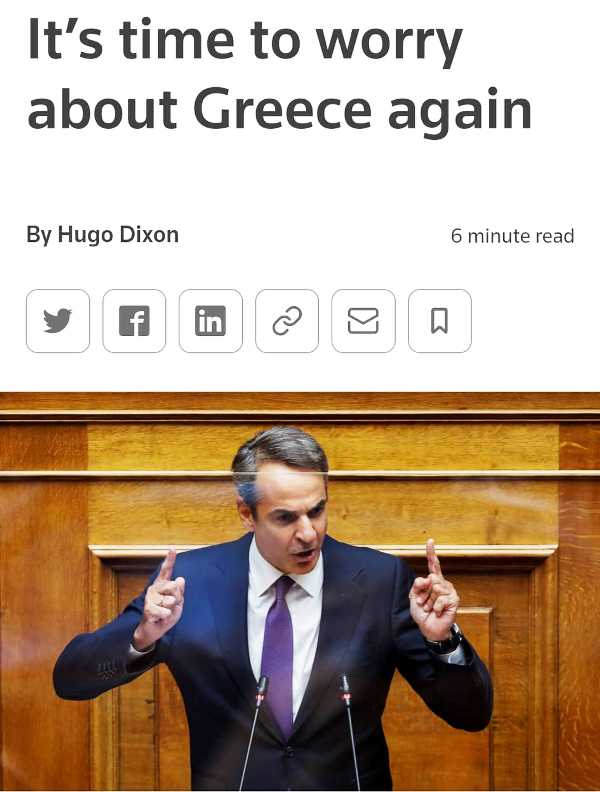Ακόμα ένα άρθρο «καταπέλτης» για την κυβέρνηση Μητσοτάκη έρχεται στο φως της δημοσιότητας, τη στιγμή που οι κλονισμοί στο Μέγαρο Μαξίμου από την υπόθεση υποκλοπών, είναι ακόμα αισθητοί. Αυτή τη φορά, η σκυτάλη πέρασε στο Reuters και στον διεθνώς αναγνωρισμένο Hugo Dixon, ο οποίος δημοσιεύει άρθρο με τίτλο «Ήρθε η ώρα να ανησυχήσουμε ξανά για την Ελλάδα».
Ο Dixon επισημαίνει τον κίνδυνο πολιτικής αστάθεια αλλά και τις υψηλές προσδοκίες που είχαν αρχικά οι επενδυτές για την κυβέρνηση Μητσοτάκη, τονίζοντας ότι στην ουσία καθάρισε τα ονόματα πολλών χρηματοδοτών και «έδωσε κάτι που ισοδυναμούσε με αμνηστία σε μεγάλους φοροφυγάδες».
Ο Dixon αρχίζει το άρθρο του με αναφορές στο θρίλερ του Grexit που αν και έχει τελειώσει «δυστυχώς, οι πιστωτές, οι επενδυτές και οι σύμμαχοι της Ελλάδας πρέπει να αρχίσουν να ανησυχούν ξανά για τη χώρα. Ένα σκάνδαλο υποκλοπών αποτελεί απειλή για την κυβέρνηση Μητσοτάκη και για παρατεταμένη πολιτική αστάθεια».
Εν συνεχεία, ο αρθρογράφος επισημαίνει τις καταγγελίες του προέδρου του ΠΑΣΟΚ-ΚΙΝΑΛ, Νίκου Ανδρουλάκη, για την παρακολούθηση του κινητού του τηλεφώνου, αλλά και την άρνηση του Κυριάκου Μητσοτάκη πως ό,τι συνέβη ήταν εν γνώσει του.
Πολιτική αστάθεια
Σύμφωνα με τον Dixon «αν και ο Μητσοτάκης έχει σταθερή πλειοψηφία, πρέπει να προκηρύξει εκλογές το αργότερο μέχρι τον Αύγουστο του 2023. Αυτό θα διεξαχθεί με αναλογική, με αποτέλεσμα κανένα κόμμα να μην έχει τη συνολική πλειοψηφία. Στη συνέχεια, θα γίνουν δεύτερες εκλογές, βάσει νέου νόμου, που θα δώσει στο ηγετικό κόμμα μεγάλο αριθμό μπόνους βουλευτών.
Οι δημοσκοπήσεις έδειχναν προηγουμένως ότι ο Μητσοτάκης θα κέρδιζε την πλειοψηφία σε αυτές τις δεύτερες εκλογές – ή θα πλησίαζε να το κάνει. Όμως, μετά το ξέσπασμα του σκανδάλου με τις υποκλοπές, αυτό δεν φαίνεται πλέον πιθανό. Επιπλέον, θα του είναι δύσκολο να σχηματίσει συνασπισμό, καθώς ο προφανής συνεργάτης του ήταν το ΠΑΣΟΚ, που θα είναι εξαιρετικά απρόθυμο να συμφωνήσει με τον Μητσοτάκη.
Ωστόσο, θα είναι επίσης δύσκολο για το μεγαλύτερο κόμμα της ελληνικής αντιπολίτευσης, τον ΣΥΡΙΖΑ, να σχηματίσει συνασπισμό. Αν και θα προσπαθούσε να κλείσει μια συμφωνία με το ΠΑΣΟΚ οι δύο ομάδες πιθανότατα δεν θα είχαν την πλειοψηφία. Μπορεί να καταφέρουν να το αποκτήσουν μόνο μέσω ενός φανταστικού συνασπισμού που περιλαμβάνει τους κομμουνιστές και την ακροδεξιά».
Το σενάριο… αντικατάστασης Μητσοτάκη
Εν τω μεταξύ, ο Dixon αναφέρεται και στο ενδεχόμενο… αντικατάστασης του Κυριάκου Μητσοτάκη. «Υπάρχουν και άλλες δυνατότητες. Η ΝΔ μπορεί να αντικαταστήσει τον Μητσοτάκη με έναν ηγέτη πιο ελκυστικό στο ΠΑΣΟΚ. Ένα άλλο είναι ότι τα ελληνικά κόμματα μπορεί να σχηματίσουν έναν μεγάλο συνασπισμό, με επικεφαλής έναν τεχνοκράτη. Όμως κανένα από τα σενάρια δεν φαίνεται τρομερά σταθερό» επισημαίνει και υπογραμμίζει πολλά ερωτήματα σχετικά με τις παρακολουθήσεις παραμένουν αναπάντητα, ενώ εκφράζει την εκτίμηση ότι «εάν υπάρξουν περαιτέρω επιζήμιες αποκαλύψεις, ο Μητσοτάκης μπορεί να δυσκολευτεί να μείνει μέχρι τις εκλογές».
Οι υψηλές προσδοκίες
Παράλληλα, ο Dixon επισημαίνει ότι επενδυτές και σύμμαχοι της Ελλάδας ήταν ενθουσιασμένοι με την πρωθυπουργία Μητσοτάκη, λόγω της υπέρ των επιχειρήσεων πολιτικής του αλλά της υπόσχεσης να ασκήσει μια υγιή δημοσιονομική πολιτική. Εξάλλου, ο ίδιος διαχειρίστηκε καλά την πανδημία, προώθησε την ψηφιοποίηση της κυβέρνησης και έκανε βήμα προς την πράσινη οικονομία.
«Υπάρχουν όμως και ανησυχίες. Ο Μητσοτάκης δεν φάνηκε να ενδιαφέρεται τρομερά για την καταπολέμηση της διαφθοράς. Ουσιαστικά “καθάρισε” πολλούς χρηματοδότες που κατηγορούνταν για εγκληματική παραβίαση εμπιστοσύνης και έδωσε κάτι που ισοδυναμούσε με αμνηστία σε μεγάλους φοροφυγάδες. Επίσης συγκέντρωσε την εξουσία, αλλάζοντας το νόμο έτσι ώστε η υπηρεσία πληροφοριών να αναφέρεται στο γραφείο του» επισημαίνει ο αρθρογράφος του Reuters και συνεχίζει «την ίδια στιγμή, η δημοσιονομική πολιτική ήταν πιο χαλαρή από ό,τι θα περίμενε κανείς για μια χώρα που είχε πρόσφατα βιώσει μια επιθανάτια εμπειρία. Η κυβέρνηση μοίρασε πολλά χρήματα για τη στήριξη επιχειρήσεων και εργαζομένων κατά τη διάρκεια της πανδημίας. Έχει επίσης ξοδέψει μεγαλύτερο ποσοστό του ΑΕΠ από οποιαδήποτε άλλη χώρα της ΕΕ για να προστατεύσει τους καταναλωτές και τις επιχειρήσεις από την ενεργειακή κρίση, σύμφωνα με τον Bruegel, το think tank με έδρα τις Βρυξέλλες».
Λαϊκισμός ενόψει
Τέλος, ο Dixon επισημαίνει τον κίνδυνο ανόδου του λαϊκισμού στην Ελλάδα.
«Μια νέα κυβέρνηση φαίνεται πιθανό να είναι λιγότερο φιλική προς τις επιχειρήσεις από την τρέχουσα. Υπάρχει, επίσης, ο κίνδυνος ο Μητσοτάκης να λάβει λαϊκιστικά μέτρα –ειδικά δαπανώντας περισσότερα χρήματα για να περιορίσει τους λογαριασμούς ενέργειας– σε μια προσπάθεια να παραμείνει στην εξουσία.
Καθώς η μία εκλογική αναμέτρηση θα διαδέχεται την άλλη, άλλα κόμματα θα έχουν το κίνητρο να υποσχεθούν περισσότερες δημόσιες δαπάνες».
Αν και οι πιστωτές της Ελλάδα ενδεχομένως να μην ανησυχήσουν καθώς το ελληνικό χρέος έχει αναδιαρθρωθεί, οι δημοσιονομικοί κανόνες της ΕΕ έχουν ανασταλεί, ενώ οι πολιτικές εξελίξεις στην Ιταλία είναι σοβαρότερο πρόβλημα για την ΕΕ.
Μακροπρόθεσμα, όμως, οι Βρυξέλλες εκτιμάται ότι θα αλλάξουν στάση απέναντι στην Ελλάδα. Άλλωστε, σύμφωνα με το άρθρο του Reuters, «από το 2033 ο λογαριασμός της Ελλάδας για αποπληρωμές και τόκους θα εκτιναχθεί κατακόρυφα», ενώ «υπάρχουν ήδη ενδείξεις ότι οι επενδυτές ανησυχούν (…) Επιπλέον, μόλις τελειώσουν οι γεωπολιτικές και ενεργειακές κρίσεις, η ΕΕ μπορεί να μην είναι τόσο πρόθυμη να κλείσει τα μάτια σε αυτό που συμβαίνει στην Αθήνα».
Τέλος, ο Dixon επισημαίνει και το ενδεχόμενο, η Κομισιόν να μετανιώσει για το γεγονός ότι η Ελλάδα βγήκε από το καθεστώς της ενισχυμένης εποπτείας.
ΤΟ ΑΡΘΡΟ ΣΤ ΑΓΓΛΙΚΑ
ATHENS, Aug 26 (Reuters Breakingviews) – It is only a few years since the Grexit horror movie ended. But sadly Greece’s creditors, investors and allies need to start worrying about the country again. A bugging scandal threatens Prime Minister Kyriakos Mitsotakis’ government and prolonged political instability. This is not a re-run of the crisis that threatened to eject Greece from the euro. But the state’s high deficit and debt – which is 189% of GDP – are a cause for concern at a time of soaring energy prices and rising interest rates.
Earlier this month the leader of Pasok, one of Greece’s opposition parties, accused the country’s intelligence service of bugging his phone. There had also been an unsuccessful attempt from an unknown source to infect his phone with spyware, called Predator.
Mitsotakis, leader of the centre-right New Democracy party, said he was unaware of the phone tapping and wouldn’t have approved it if he had known read more . He fired the head of the intelligence service. The government’s general secretary, to whom the intelligence service reported and who is Mitsotakis’ nephew, also quit. The government denies purchasing or using Predator. Nevertheless, the Greek parliament has reconvened to debate the issue today.
POLITICAL INSTABILITY
Although Mitsotakis has a solid majority, he has to call an election at the latest by August 2023. This will be fought under proportional representation, with the result that no party will get an overall majority. There will then be a second election, under a new law, which will give the leading party a large number of bonus members of parliament.
Opinion polls previously suggested Mitsotakis would win a majority in this second election – or come close to doing so. But following the eruption of the bugging scandal, this no longer seems likely. What is more, it will be hard for him to form a coalition, as his obvious partner was Pasok, the centre-left party whose leader’s phone was tapped. It will be extremely reluctant to do a deal with Mitsotakis.
However, it will also be hard for Greece’s largest opposition party, the left-wing Syriza, to form a coalition. Though it would try to cut a deal with Pasok, the two groups probably wouldn’t have a majority. They might only be able to get one via a fanciful coalition including the communists and the far-right.
There are other possibilities. New Democracy might replace Mitsotakis with a leader more appealing to Pasok. Another is that Greek parties might form a grand coalition, led by a technocrat. But none of the scenarios looks terribly stable. Meanwhile, many questions about the bugging scandal remain unanswered. If there are further damaging revelations, Mitsotakis may struggle to hang on until the election.
HIGH EXPECTATIONS
Investors and Greece’s allies have been generally enthusiastic about Mitsotakis’ premiership. His pro-business approach and pledge to modernise the country attracted capital. His promise to run a sound fiscal policy reassured the European Union, which holds the lion’s share of the country’s humungous debt. He managed the pandemic well, drove forward the government’s digitalisation, and took steps to decarbonise the economy. And his firm line against Russia’s invasion of Ukraine got plaudits not just in other European capitals but also in Washington. He even delivered a speech to a joint session of U.S. Congress.
There are also concerns, though. Mitsotakis didn’t seem terribly interested in fighting corruption. He effectively wiped the slate clean for many financiers accused of criminal breach of trust and gave what amounted to an amnesty to large tax evaders. He also centralised power, changing the law so that the intelligence service reported to his office.
At the same time, fiscal policy was looser than might have been expected for a country that had recently gone through a near-death experience. The government handed out a lot of money to support firms and workers during the pandemic. It has also spent a larger proportion of GDP than any other EU country cushioning consumers and businesses from the energy crisis, according to Bruegel, the Brussels-based think tank. The government is on course to run a primary deficit (before interest payments) of about 3.5% of GDP this year, according to Miranda Xafa, a Greek economist.
POPULISM AHEAD
A new government seems likely to be less pro-business than the current one. There is also a risk that Mitsotakis will take populist measures – especially spending yet more money to cap energy bills – in an attempt to hang onto power. As one election follows another, other parties will have the incentive to promise more public spending.
Greece’s creditors might argue that this doesn’t matter too much. The country’s debt was restructured as part of its bailouts. It doesn’t have to repay the principal or interest on the debt it owes the EU until 2033. What is more, although debt has been rising, the combination of inflation and economic growth means the burden has shrunk as a percentage of GDP: the ratio declined by 4 percentage points in the first quarter of the year.
Meanwhile, the EU may well avoid friction with Greece given that Europe is in the midst of a geopolitical and economic crisis. It has already suspended the bloc’s fiscal rules, which are supposed to keep national debt and deficits under control. And the EU is much more worried about instability in Italy following the fall of Mario Draghi’s government.
These factors shield Greece in the short run. But they may not be enough if there is a prolonged period of instability. After all, the government still needs to finance its ongoing deficit. From 2033 its bill for repayments and interest will jump sharply.
There are already signs investors are getting anxious. Greek 10-year government bonds were yielding 3.9% on Friday morning, up 93 basis points in the past month, and 256 basis points higher than equivalent German Bunds. While government bond yields have been rising across the world, yields on Greek debt have risen faster recently even than Italy’s, which have gone up 34 basis points to 3.6% in the past month.
What’s more, once the geopolitical and energy crises are over, the EU may not be so willing to turn a blind eye to what is happening in Athens. Last week, the European Commission ended its “enhanced surveillance” of the Greek economy, on the basis that the country was finally out of the woods. That is a decision it may ultimately regret. / REUTERS














